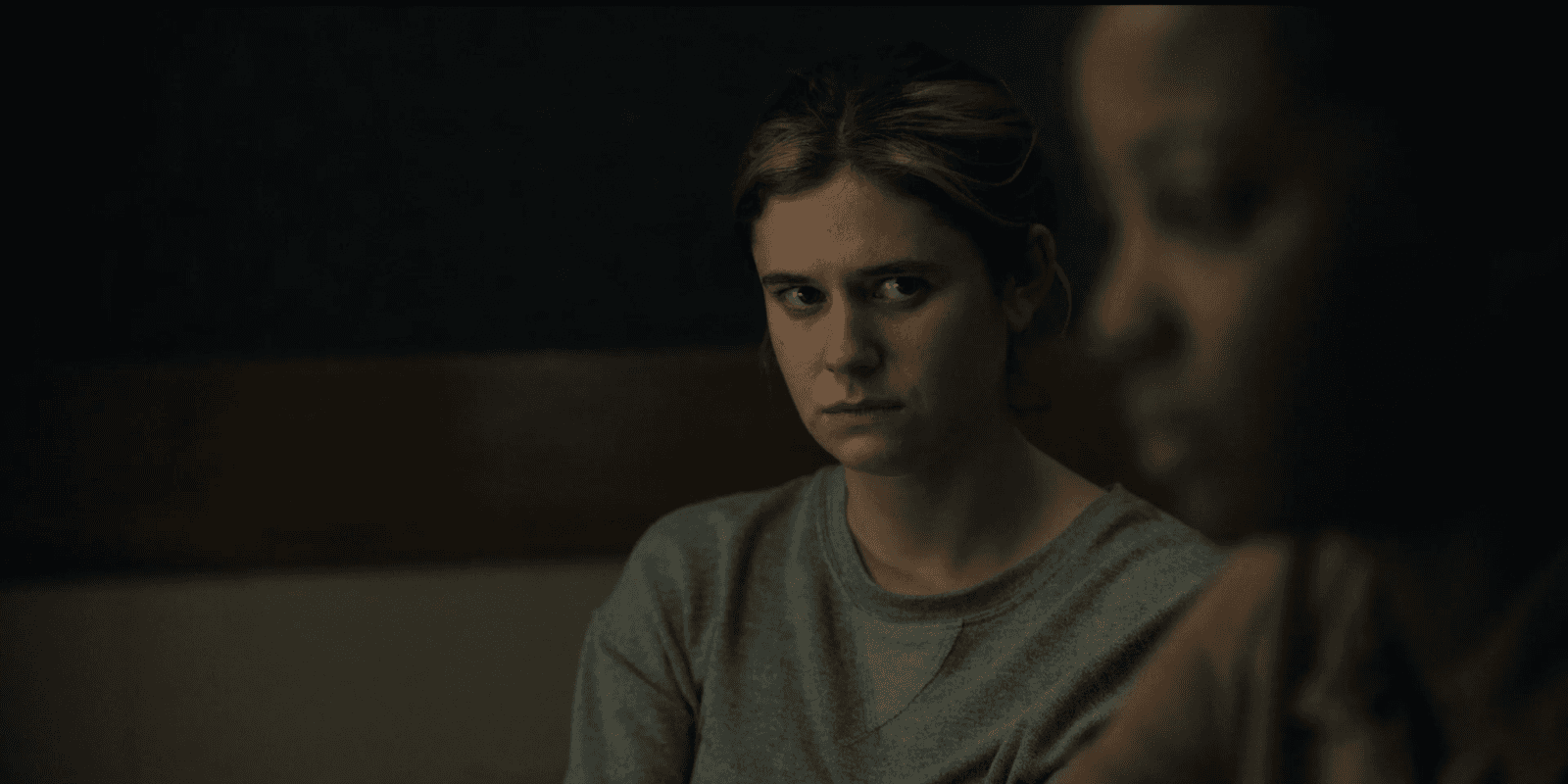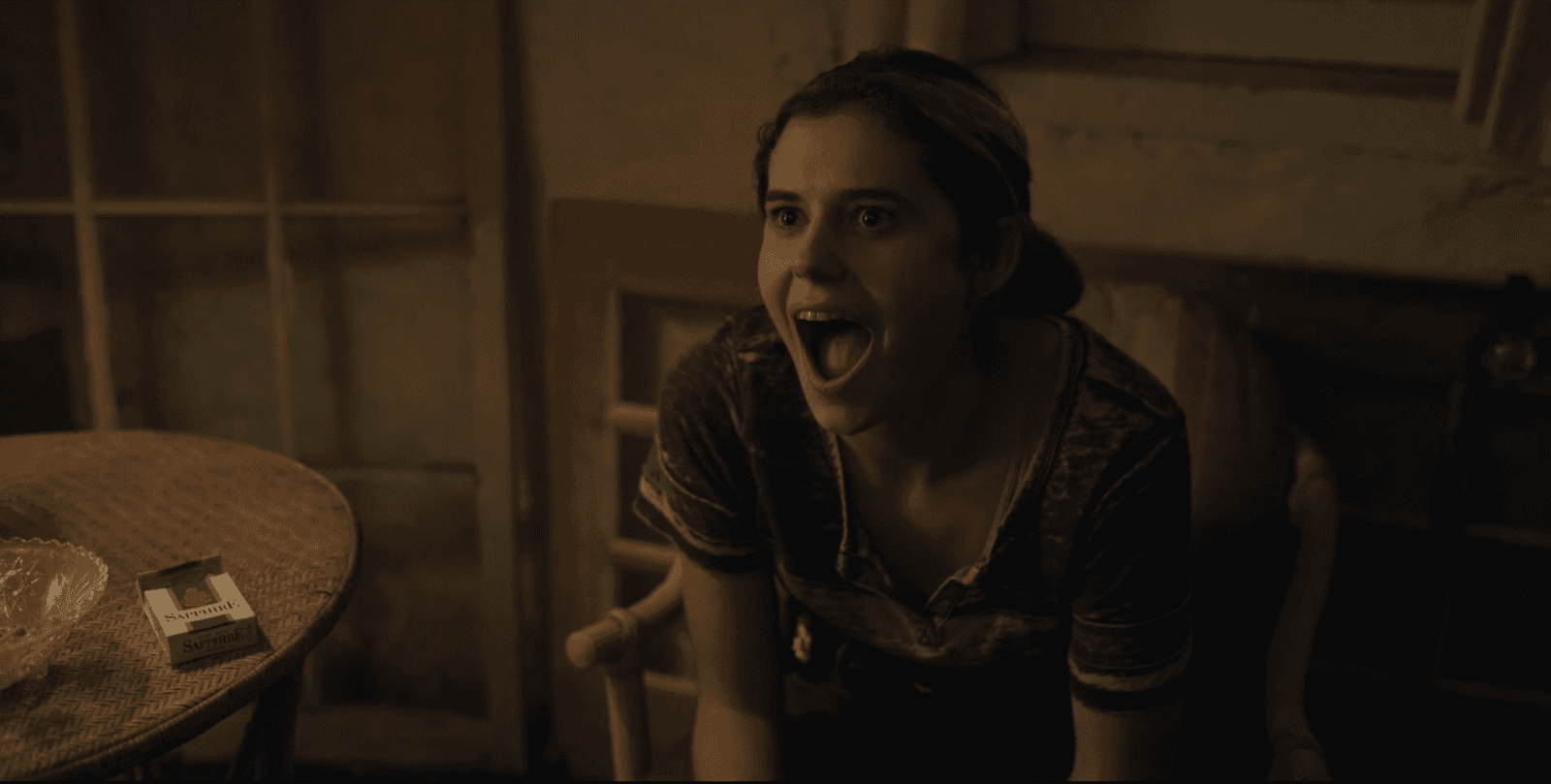
Task’s poster children may be sad dads, but there’s another character who’s bent me over her recliner and won me over: the insecure, infuriating, incomparable Lizzie Stover. Episode 4, “All Roads,” ramped up the violence and the stakes for Tom Brandis, Robbie Prendergrast, et al.: The Dark Hearts got to Cliff Broward before the feds could, and both Tom and biker gang chief Perry Dorazo are getting closer to finding the elusive Robbie. But while I kept averting my gaze as Cliff slipped away from the FBI and into the hands of the Dark Hearts, I couldn’t tear my eyes off the screen anytime Lizzie showed up to lighten the mood and belt out “The Sweet Escape.” Her sincere, sometimes miscalculated efforts to be a good cop—and her full-throated, enduring love for Gwen Stefani and the nickname “DJ Grassanopussy”—make her the foulmouthed, hard-drinking standout of a cast that’s already full of them.
Task has been found wanting (especially in comparison with its predecessor, Mare of Easttown) because of its lack of central female characters and its unrelenting, just-short-of-comical drudgery. But Tom and Co. can’t, and mercifully don’t, exist in a world without women, and these women are the ones injecting life and urgency into this show—whether it’s Eryn dealing Jayson’s long-simmering comeuppance, Maeve playacting as an angsty mom, Emily reading her dad to filth (after spewing up some cherry water ice), or Aleah striking fear in the hearts of all men in Delaware County. Lizzie is probably the most flawed and frustrating of them all, but that’s also what makes her a rightful heir to Mare—another former high school athlete (Mare played basketball, Lizzie softball) who’s gotten her share of bad hands and breakups, isn’t necessarily the most praiseworthy cop, smokes like a chimney (although Mare preferred her vape to Lizzie’s cigarettes), and is rounded out by an occasional levity that makes her seem more real—and sets her apart from all the grim-faced men in her midst.
But unlike Mare, who’s a pretty good detective even if she sometimes, brazenly, breaks the rules, Lizzie may not have found her true vocation in police work. From the moment we first meet her—both appalling and winning as she berates her recliner-scavenging ex on the phone and calls him a “raccoon fuck”—she’s demonstrated some questionable choices. But also an inimitable way with words and a scrappy personality! Many of her ensuing foibles (neglecting to read the case briefing, loudly complaining about mildew stench, using the email snickerdoodle223@yahoo.com for professional correspondence, shopping online for crackers, and vocalizing along to good old Gwen) were pretty excusable. But they were also charming, at least for some viewers and a certain fellow detective. And all those missteps could just be chalked up to her inconveniently timed divorce and an endearing tendency to wear her heart on the sleeve of her Philadelphia Eagles Henley.
What was less excusable was when Lizzie choked during the task force’s raid on Cliff’s house. She stood by while Ray threw Tom down the stairs, and Grasso had to be the one to chase him down. But while she might have lost Tom’s trust, she eventually won Grasso over by admitting that she had a history of freezing up in moments like that. When he gives her a pat solution—she’s a good person, so she’ll do the right thing when the time comes—she doesn’t buy it. “That’s the most bullshit line I’ve ever heard,” she tells him. “Oh my God, I know so many good people that’ve made so many nasty, vindictive, fucking, like, horrible decisions.”
That piece of wisdom—that you can never just trust you’ll make the right choices because you’re a decent person—is a lesson that plenty of other characters on Task could stand to learn. (Looking at you, Robbie.) And, with time, knowing that she’s a good person who sometimes makes some pretty bad mistakes could help her become a good cop, too. Lizzie freezes because she’s worried about fucking up, and because she knows she’s fucked up plenty of times before. A good cop, or just a good person, should keep that fear on hand all the time but learn how to manage it and act anyway. Because, after all, having the unearned confidence that you’re always making the right move is how you end up selling out to a biker gang or robbing trap houses in the middle of the night.
In “All Roads,” Lizzie airs out more of her self-doubt to Aleah when she learns that her task force partner is an expert marksman (and the reigning Police Pistol champ). Lizzie doesn’t come across as jealous or competitive when she finds out about Aleah’s résumé; instead, it adds to her growing admiration for her would-be friend, and she earnestly wishes that she knew the one thing she’s good at, too. But maybe this is Lizzie’s one thing: that she’s able to have conversations like this with a normally buttoned-up person like Aleah in the middle of a high-intensity situation like a stakeout. That her lack of varnish and self-confidence can win people over despite her other flaws. And that she’s open about her faults in a way that could get other people to admit theirs. (She might not have gotten there with Aleah yet, but I can see the ice starting to thaw.) It’s also why she’s so damn likable even when she fucks up: She owns it, and you can see she wants to get better without taking the easy way out by putting on some armor of false bravado or looking away from her own shortcomings. She’s easy to admire, or at least like, because her insecurities are easy to relate to—who doesn’t want to be better at their job than they are, and who doesn’t wish they could find that one thing they’re good at?
As for Lizzie’s other partner on the task force, I’m not sure whether she and Grasso are a good match or not—their pairing is more likely to combust than to become everlasting—but it’s fun watching her rib DJ Grassanova and get him to set aside some of his confidence to be a little less smooth, a little more like Lizzie. And all her character details—the money pieces she probably dyed in her bathroom when she was a little drunk, going back and forth on whether to give her ex that recliner, the tons of KY Jelly she’s apparently keeping in her bedside drawer—win us over just as much as they do Grasso and make her harder to forget.
Credit for that goes not just to showrunner Brad Ingelsby but to Alison Oliver, who breathes all the Pennsylvania-accented, Yuengling-drinking soul she can into Lizzie. It’s a departure from the roles Oliver was known for before this, as one of Sally Rooney’s sensitive, self-loathing waifs in Conversations With Friends and one of Emerald Fennell’s insensitive, self-loathing hedonists in Saltburn. But Oliver’s just as good as Mark Ruffalo or Tom Pelphrey in their roles; even though she’s not carrying around as much trauma, she’s got a live-wire, defensive energy that can toggle right over into humiliation or fear or joy. The camera likes to linger on her as she reacts to her partners, eating up the sympathy and shame she’s feeling when Aleah talks to Shelley Wilkins in the interrogation room:

Or she’ll go straight from a passionate defense of her snickerdoodle223 email handle to unfiltered joy when Grasso gives her his DJ Grassanova backstory:

Even the way she sits and walks—a little ungainly, like she’s not totally comfortable in her own skin—speaks to Lizzie’s self-consciousness and her lack of inhibitions. Oliver, who’s Irish, also nails the Delco accent in proclamations like “I’m not gonnew, like, fuck yew on my rug or bend oover the side of my recliner.” Lizzie seems very much like someone you’d meet in real life—that worn-in signature of Ingelsby’s shows—and not an efficient, cold detective who’ll get to the bottom of things by the end of the episode.
In fact, I doubt Lizzie will be the one to get to the bottom of anything (although it would really feel like a win if she did). It’s possible that she could even be the one who fucks up the task force’s investigation or gets somebody killed. But it’s just as possible that any of them could royally fuck things up. Tom, Aleah, Grasso, and Lizzie are all operating in the dark against antagonists they aren’t fully aware of yet. Lizzie’s not smooth like Grasso or competent like Aleah or jaded like Tom, but what Task has shown, so far, is that no matter how good you are at your job, it might not even matter. There are always things you don’t know about—whether it’s some biker gang’s grand plan or just the reason a robber might make off with a kid—that’ll conspire against you and sabotage your best-laid plans. PSP Lizzie Stover recognizes that she might be the one to get in someone’s way or make a critical error that lets the bad guys go free. But she’s got that double edge of shame and shamelessness that comes from knowing who you are and wanting to be better. And despite all her faults, that, at least, is something to admire.
